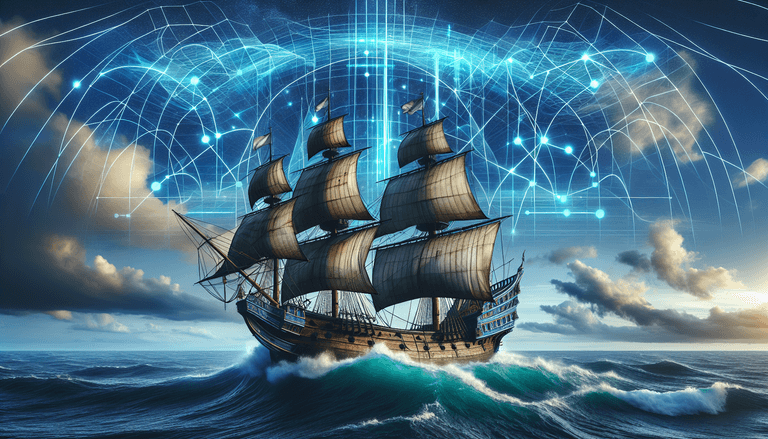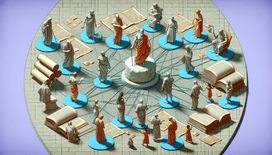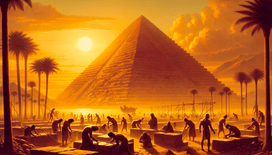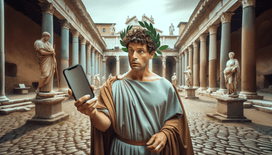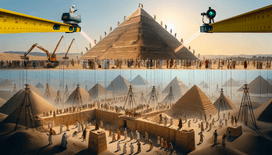Ah, the Age of Exploration! A time when daring adventurers set sail into the great unknown, guided only by the sun, stars, and a map that looked like it had been drawn by a toddler on a sugar high. It's a miracle they didn't end up asking indigenous people for directions more often. But imagine, if you will, how things might have been different had these intrepid voyagers been equipped with our nifty modern technology: the Global Positioning System.
The Magellan Magellan
Remember Ferdinand Magellan, the brave (if slightly lost) navigator who embarked on a quest to circumnavigate the globe? Picture him standing on the deck of his ship, the Trinidad, clutching a handheld GPS. No more squinting at the sky or relying on the dubious accuracy of a compass that seemed determined to point towards the nearest tavern. Instead, he could simply type "world circumnavigation" into the GPS, choosing the "fastest route" option, and off he'd go!
Of course, there'd be a few inevitable voice commands: "In two thousand nautical miles, turn starboard." But imagine the sheer relief when faced with tempting archipelagos. Why get marooned when your trusty GPS cheerily says, "Recalculating… you will arrive at the Spice Islands on Wednesday, by tea time"?
Columbus: Lost No More!
Poor Christopher Columbus, forever believing he was in Asia, when he actually ended up in the Bahamas. With a GPS, instead of mistaking the Western Hemisphere for India, Columbus would have confidently landed where he intended, receiving congratulatory notifications, "You've reached the Spice Route, bravo explorer!"
Though one has to wonder if Columbus’ quest would’ve been less grand had he just punched in "spices" and followed an arrow. Perhaps there would be less sailing into the unknown and more sitting with an espresso, glancing at the route with a dash of, "Are we there yet?" envy.
Negotiating with Nassau
Negotiators and tradesmen, those often unsung heroes of maritime voyages, would surely rejoice at never having to play the "which island did I land on?" guessing game. The Basques, those salty dogs who negotiated furiously for fishy profits, would love to have had a GPS's reassuring British accent softly saying, "You are now entering monetary waters." Had there been underwater wifi, they might even have turned around and gone home before the first pyrate came splashing up the gangplank.
The Sardonic Sailing of Sir Francis Drake
Imagine Sir Francis Drake, Elizabeth I’s favourite privateer, keen on not just nicking Spanish gold but also enjoying a good jab. Equipped with a GPS, his raiding missions would surely have been more efficient: "In 500 leagues, you’ll reach El Dorado. Arrr, don’t forget to divert toward treasure!"
Would he have felt so impish if his technology demanded "Proceed with boarding manoeuvres in 100 metres"? Goodbye legendary tales, hello turn-by-turn piracy! Where's the challenge in outsmarting a Spaniard when your map facepalms with a "recalculating…"?
How Technological Seas Might Have Turned the Tide
Can you imagine the trade-offs? Sure, there’d be no excuse for cartographers to invent new creatures, like the kraken. On the other hand, the world would likely have been 'discovered' at a quicker clip. No more months at sea wondering, "Is the Earth round or did we just flip world maps upside down again?" Modern GPS technology would indeed have revolutionised how explorers like Cook, Vespucci, and Cabot viewed voyage success.
With coordinates at their command, the Age of Exploration might sail smoothly and efficiently, lacking perhaps the romantic fumbling of a mystery unfolding. Surely, we'd have been spared countless arguments over coastline ownership. "But my GPS said this would've been England!" versus "Nope, clearly Spanish." Draw on those French lines as pleased!
Yet, beyond the jokes, adding today's wonders to the adventures of old prompts one to ponder: would discovery lose its luster without the thrill of unforeseen detours? Would humanity have progressed differently, scoffing at exploration protocols in favour of levelling up? In the end, perhaps the grand adventures and mishaps gifted by history serve as much needed reminders: sometimes, it's not about where we end up, but how we navigate the currents along the way.
